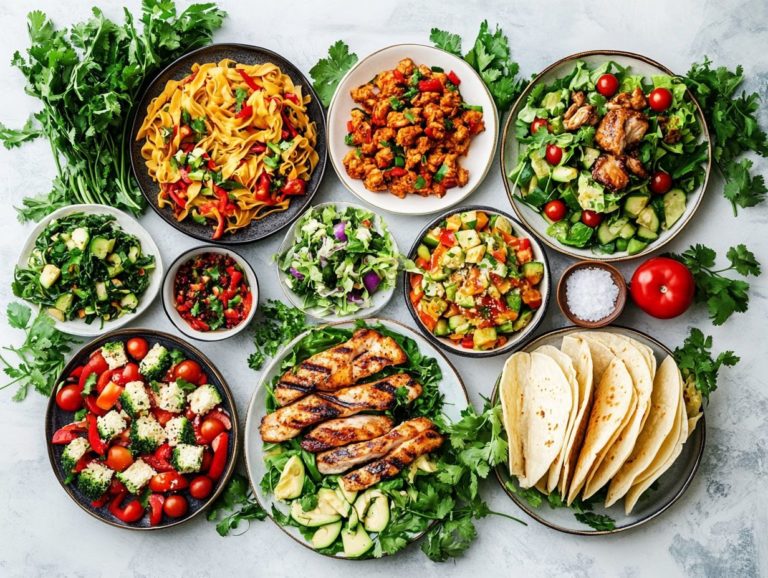7 Reasons to Start Meal Planning Today
Meal planning is more than just a trendy buzzword; it s a powerful strategy that can truly transform your eating habits and lifestyle.
Consider these seven compelling reasons to embrace meal planning:
- It saves you time and money.
- It promotes healthier eating habits.
- It helps reduce food waste.
Whether you re managing your weight, accommodating dietary restrictions, or simply looking to alleviate the stress of daily meal decisions, meal planning provides practical solutions tailored to your needs.
You will find essential tips and tools to help you get started and sidestep common pitfalls along the way. Dive in to discover how meal planning can elevate your culinary experience and simplify your life!
Contents
Key Takeaways:
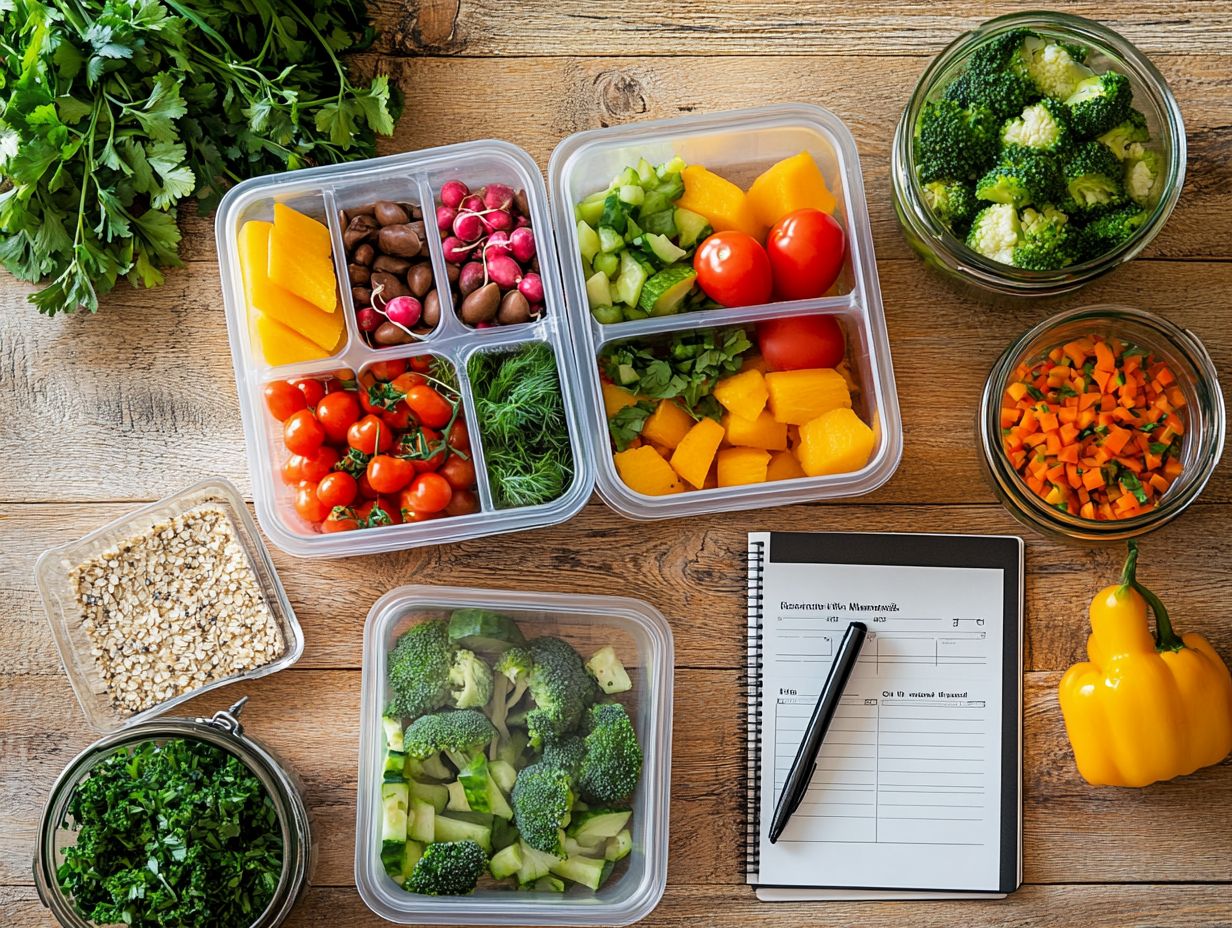
- Meal planning can save time and money by reducing last-minute trips to the grocery store and preventing food waste.
- It can also help with weight management by promoting healthier food choices and portion control.
- Meal planning enables individuals to accommodate dietary restrictions and provide variety in meals, creating a balanced and stress-free eating experience.
1. Saves Time and Money
Meal planning is a game-changer for your lifestyle! It can significantly save you both time and money, enabling you to enjoy healthy meals while effectively managing your food budget and grocery shopping routines.
By dedicating some time to create organized meal plans, you can streamline your cooking practices, reduce clutter in the kitchen, and minimize unnecessary grocery trips that contribute to food waste and financial strain.
Research indicates that families who engage in meal planning can cut food expenses by up to 15%, all thanks to more informed purchasing decisions and less impulse buying. Preparing meals in advance not only alleviates the stress of daily cooking but also encourages a diverse and balanced diet.
Utilizing grocery lists directly correlates with smarter shopping habits, as you re less likely to make spontaneous purchases. In fact, studies show that maintaining a grocery list can lead to a 30% reduction in unplanned expenses. By incorporating these practices, you can effectively manage both your kitchen time and financial resources, transforming your mealtime experience into something efficient and enjoyable.
2. Helps with Weight Management
Effective meal planning is crucial for successful weight management. It allows you to create balanced diets that are rich in nutritious meals tailored to your dietary needs and personal goals.
By organizing your meals in advance, you not only streamline your grocery shopping but also curb those impulsive food choices that can set you back. This method gives you the power to make mindful food selections, making it easier to control portion sizes and incorporate a diverse array of healthy recipes into your daily routine.
To achieve effective meal balance, consider including a combination of lean proteins, whole grains, and vibrant vegetables. This ensures that you meet all your nutritional needs. Thoughtful meal scheduling also accommodates various dietary restrictions, promoting inclusivity and catering to individual preferences whether you re navigating vegetarian, gluten-free, or other specialized diets.
3. Encourages Healthier Eating Habits
Meal planning gives you the power to adopt healthier eating habits by enabling you to make informed food choices. It provides a structured approach to preparing nutritious meals that showcase a variety of ingredients.
By thoughtfully organizing your meals for the week, you’ll find it easier to incorporate seasonal produce think vibrant summer tomatoes and autumn squash. Not only do these ingredients elevate the freshness of your dishes, but they also introduce you to a delightful array of flavors.
This method can enhance your cooking skills as you experiment with new recipes and techniques, turning home cooking into a truly enjoyable and rewarding experience. Imagine whipping up a colorful stir-fry packed with fresh, in-season vegetables or a hearty soup brimming with root vegetables both nutritious and satisfying.
Ultimately, meal planning cultivates a positive outlook on cooking at home, giving you the power to explore a variety of healthy options that align perfectly with your dietary goals.
4. Reduces Food Waste
One of the biggest advantages of meal planning is its amazing ability to reduce food waste. It encourages better kitchen organization, precise grocery shopping, and the efficient use of seasonal ingredients.
By taking a moment to outline your meals for the week, you can purchase only the necessary items, minimizing spoilage and avoiding a surplus of unused food. Strategies like creating a detailed shopping list, considering portion sizes, and incorporating versatile ingredients can boost your meal prep efficiency.
Embracing leftovers allows you to transform a single meal into multiple delicious options, maximizing your resources. Studies show that households practicing meal planning can reduce food waste by approximately 25%, highlighting the environmental and economic benefits of a well-structured cooking approach.
5. Provides Variety in Meals
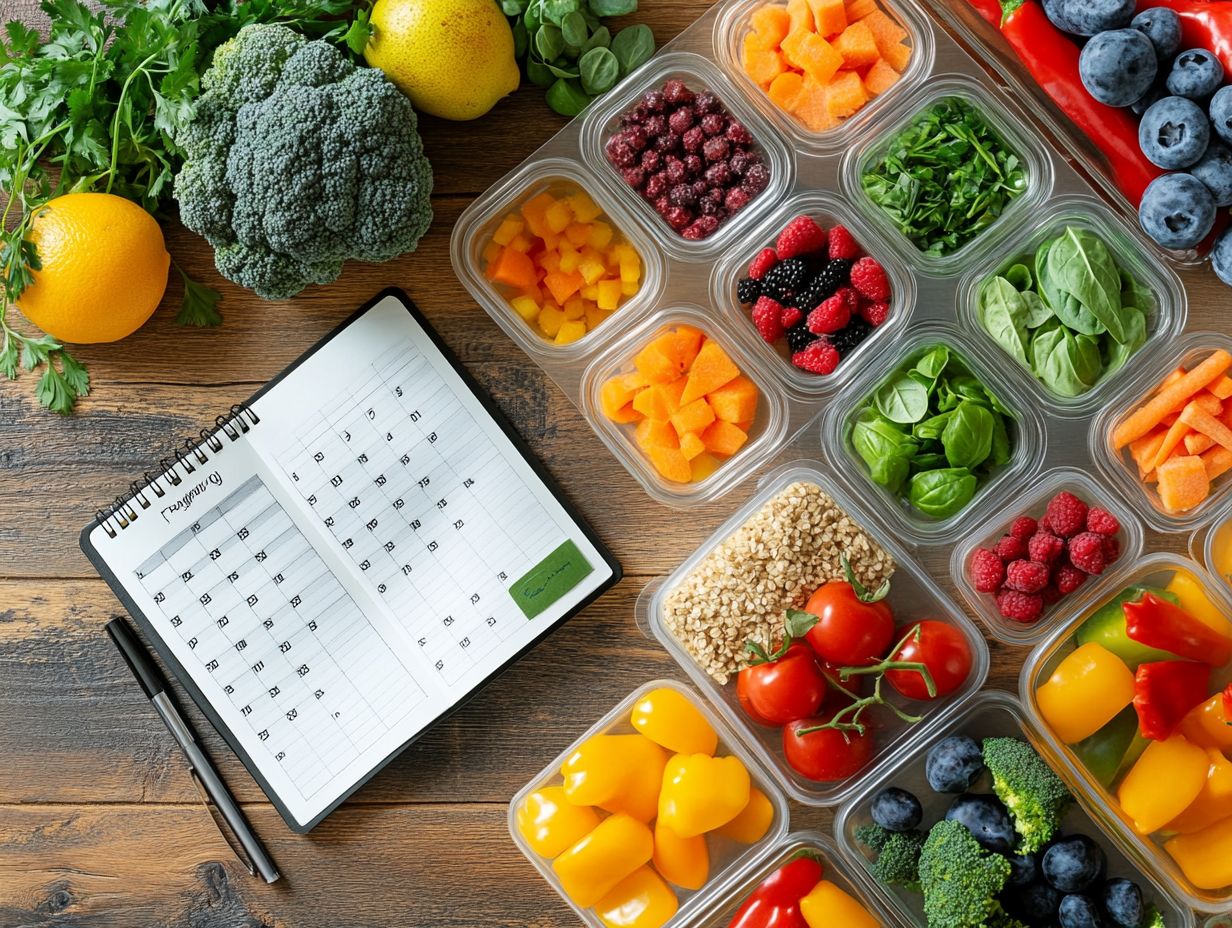
Meal planning opens up a world of different meal options, allowing you and your family to explore creativity in the kitchen while enjoying balanced meals that cater to various tastes and dietary needs.
By structuring your meal plan, you can try out new recipes and cooking techniques that you might have overlooked. Picture this: your week starts with a spicy Thai green curry, flows into a refreshing Mediterranean quinoa salad, and wraps up with a hearty Italian minestrone soup.
Using seasonal ingredients not only elevates flavor but also promotes healthy eating. Imagine vibrant spring vegetables like asparagus and peas mingling in a light pasta dish or the cozy embrace of autumn favorites like squash and root vegetables simmering in a warm stew.
This culinary adventure invites you to discover flavors from around the globe, turning mealtime into an exciting experience and enhancing your satisfaction with every dish.
6. Can Accommodate Dietary Restrictions
Meal planning is a useful way to accommodate dietary restrictions, helping you maintain a balanced diet while enjoying healthy recipes tailored to your needs.
By taking time to understand different dietary preferences, you can create meal strategies that support your health and well-being without sacrificing flavor.
- Gluten-free diet: You can enjoy quinoa salads filled with fresh vegetables and protein-rich chickpeas.
- Vegan diet: Hearty lentil stews infused with spices and vibrant veggies can be a delightful option.
- Low-carb meals: Cauliflower rice stir-fries with chicken or tofu offer a satisfying choice.
Each of these dishes meets specific dietary requirements while promoting a nutritious and colorful approach to dining.
7. Reduces Stress and Decision-Making
Implementing a consistent meal planning routine can significantly alleviate stress and decision fatigue during busy weeks, allowing you to enjoy organized meals without the last-minute scramble over what to cook.
By dedicating just a little time each week to this essential task, you ll love how easy grocery shopping becomes and minimize wasted ingredients, ensuring everything in your kitchen serves a purpose.
Involving family members in the meal planning process can elevate this experience, offering a chance for collaboration and shared responsibility. When everyone contributes ideas and preferences, it not only simplifies cooking but also strengthens familial bonds, making meal preparation a fun team-building activity.
This collaborative approach sparks creativity in the kitchen and fosters greater investment in enjoying nutritious, home-cooked meals together.
Embrace meal planning today and transform your kitchen experience!
How to Start Meal Planning?
Starting your meal planning journey involves several essential steps that streamline the meal prep process. This includes choosing the right meal planner and establishing a weekly routine to promote healthy eating and efficient cooking.
First, assess your individual dietary needs. Consider your nutritional goals and personal preferences to create a solid foundation for a balanced weekly menu.
Next, create a detailed weekly plan. This strategy organizes your shopping and helps minimize waste. Sourcing a variety of recipes keeps your meals exciting while ensuring diverse nutritional intake.
Incorporating practical cooking tips, like batch cooking preparing large amounts of food at once to save time later and pre-chopping ingredients can make your transition into meal prep smoother and more enjoyable.
Ultimately, planning ahead gives you a sense of control and encourages you to stick to healthier eating habits.
What Are the Essential Tools for Meal Planning?
Essential tools for meal planning encompass a range of resources designed to elevate your kitchen organization and streamline recipe planning.
You can easily schedule your meals for the week using meal planners. This ensures a balanced diet while saving you precious time.
Grocery apps add convenience. They enable you to create shopping lists based on selected recipes, track your pantry inventory, and discover local deals on ingredients.
Recipe books, whether traditional or digital, serve as a treasure trove of inspiration. They help you diversify your menus and avoid recipe fatigue.
Together, these tools keep your kitchen organized and enhance your meal outcomes, leading to healthier eating habits and delightful culinary experiences.
How Can One Create a Balanced Meal Plan?
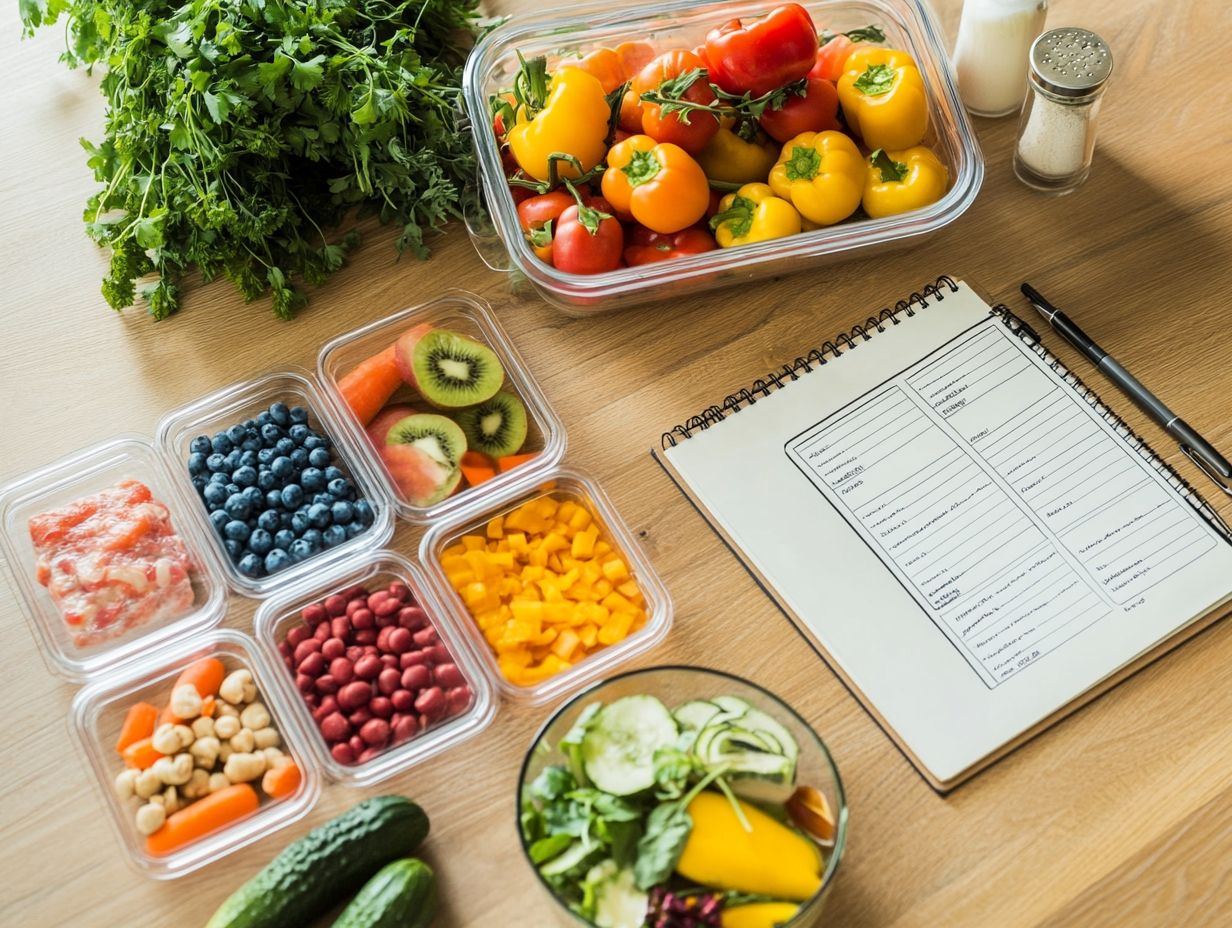
Creating a balanced meal plan involves understanding basic nutrition facts. Integrate a variety of meals that cater to your dietary needs while employing cooking strategies that promote healthy eating.
This approach ensures you enjoy your meals while receiving all the essential nutrients for optimal health. Start with a clear outline of food groups: fruits, vegetables, whole grains, lean proteins, and healthy fats.
For instance, imagine a balanced dinner featuring grilled salmon alongside quinoa and roasted seasonal vegetables like squash or Brussels sprouts. This approach makes your meals burst with flavor and enriches your nutrient intake, vital for your overall well-being.
What Are Some Meal Planning Tips for Busy Individuals?
For busy individuals like you, effective meal planning offers invaluable time management benefits. It allows you to streamline meal prep without sacrificing quality.
Dedicating just a bit of time each week to planning enables you to choose recipes that are quick to prepare and easily scalable, ensuring leftovers can be transformed into delightful new dishes.
Utilizing slow cookers is a brilliant strategy. They let meals simmer throughout the day, freeing you to focus on other tasks while dinner is prepared and ready to serve when evening arrives.
Embracing batch cooking techniques can dramatically reduce your kitchen time. This proactive approach works wonders in lessening weekly stress, ensuring nutritious options are always at your fingertips.
Start your meal planning today and transform your kitchen routine!
How Can Meal Planning Help with Meal Prep?
Meal planning is essential for enhancing your meal prep experience. It boosts your cooking efficiency and ensures well-organized meals are ready when you need them. Additionally, understanding the benefits of meal planning for health can help avoid last-minute cooking dilemmas.
By outlining your meals for the week, you can streamline your shopping lists and focus on gathering essential ingredients. This sets the stage for a smoother cooking experience. For example, consider bulk cooking cooking large batches of staples like grains and proteins on a specific day to save valuable time throughout the week. Chopping vegetables in advance and storing them properly can significantly reduce your prep time on hectic evenings.
This approach boosts your creativity in the kitchen and simplifies your commitment to healthy eating habits by eliminating the chaos of mealtime decisions.
What Are Some Common Mistakes to Avoid When Meal Planning?
Common mistakes in meal planning can disrupt your cooking, making it harder to reach your healthy eating goals.
It’s easy to get caught up in elaborate recipes that require intricate steps and hard-to-find ingredients. This can sap the enthusiasm of even the most dedicated home cook. Not planning for leftovers can lead to wasted food and increased stress throughout the week when your prepped meals disappear too quickly. Overlooking seasonal ingredients can reduce the flavor and nutrition of your dishes.
To improve your meal planning experience, focus on simplified recipes, incorporate leftovers into future meals, and embrace fresh, seasonal produce. This will help you create vibrant, delicious meals that are enjoyable and health-conscious.
Frequently Asked Questions
What are the benefits of meal planning?
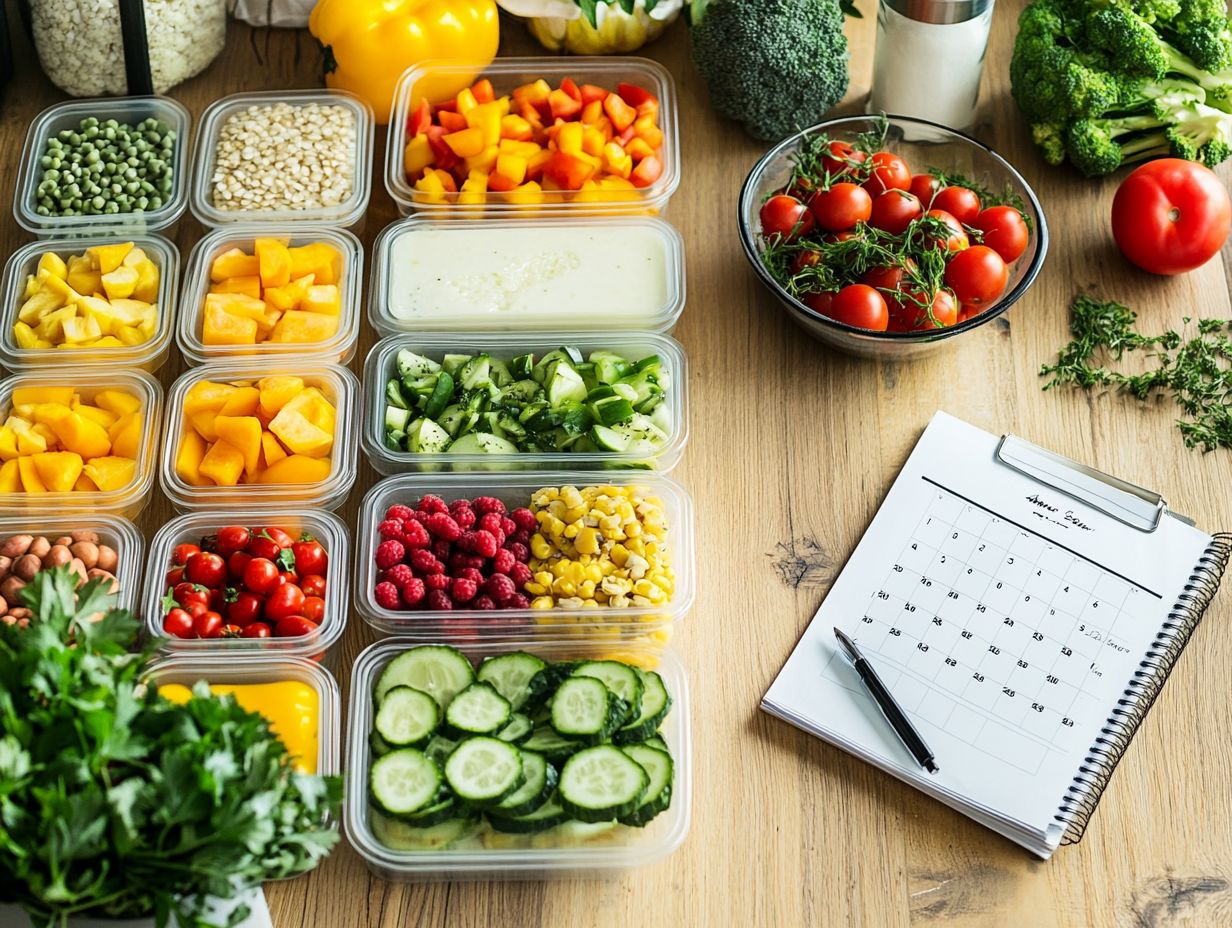
- Saves time: Planning your meals in advance saves time on deciding what to eat and grocery shopping each day.
- Saves money: Meal planning helps you stick to a budget and avoid impulse purchases.
- Reduces food waste: When you plan your meals, you only buy the ingredients you need, minimizing food waste.
- Helps with weight management: Meal planning allows you to control portion sizes and choose healthier options, making it easier to maintain a healthy weight.
- Increases variety: With meal planning, you can incorporate a variety of foods and recipes into your diet, keeping things interesting.
- Reduces stress: Knowing what you will eat each day eliminates the stress of last-minute meal decisions.
- Improves nutrition: By planning your meals, you ensure you get all the necessary nutrients in your diet.
How do I get started with meal planning?
- Choose a day to plan: Set aside time each week to plan your meals for the upcoming week.
- Take inventory: Check your pantry, fridge, and freezer to see what ingredients you already have.
- Browse recipes: Look for recipes that use the ingredients you have or want to include in your meals.
- Make a list: Based on your recipes, create a grocery list of the ingredients you need.
- Stick to your plan: Once your meals are planned and ingredients purchased, stick to your plan to avoid wasting food and money.
- Be flexible: Don t hesitate to adjust your plan if needed, such as swapping out a recipe or using leftovers in a different meal.
Can meal planning help me eat healthier?
Yes, meal planning can help you eat healthier in several ways:
- Control portions: By planning your meals, you can manage portion sizes, which is vital for maintaining a healthy weight.
- Choose healthier options: Planning allows you to consciously incorporate more nutritious foods into your diet.
- Avoid unhealthy choices: Having a plan prevents impulsive, unhealthy food choices.
- Incorporate variety: Meal planning enables you to include a range of fruits, vegetables, whole grains, and lean proteins in your diet.
- Limit processed foods: By planning, you can reduce processed foods and opt for fresher, healthier options.
Start your meal planning today for a stress-free week!
How can meal planning help me save money?
Want to save money? Meal planning is your secret weapon!
-
Stick to a budget: By planning your meals and creating a grocery list, you can stick to a budget and avoid overspending on unnecessary items.
-
Avoid unplanned buying: When you have a plan in place, you are less likely to make unplanned purchases, which can add up quickly.
-
Use leftovers: Planning your meals can help you use leftovers in creative ways, reducing food waste and saving money.
-
Buy in bulk: Buying larger quantities of food often costs less, allowing you to save money overall.
Is meal planning suitable for everyone?
Yes, meal planning can benefit anyone, regardless of their dietary restrictions, budget, or cooking skills. You can tailor meal planning to fit your lifestyle.
I am a busy person. Will meal planning add more stress to my life?
No, meal planning can actually reduce stress by eliminating the need to make last-minute meal decisions. It can also free up time during the week by prepping some meals in advance, making it easier to stick to your plan and save time in the long run.
Embrace meal planning today and reclaim your time!






